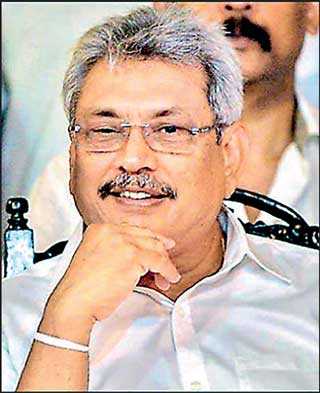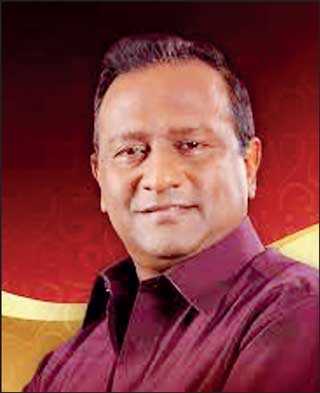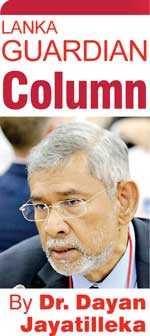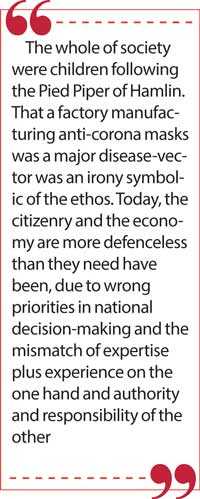Saturday Feb 14, 2026
Saturday Feb 14, 2026
Thursday, 15 October 2020 00:10 - - {{hitsCtrl.values.hits}}
Remember ‘A Country Free from Corona’? The crucial tourist sector must be hard hit by the second wave, as also the factories and supply chains. We are in a vortex of geographically spattered,
 |
| President Gotabaya Rajapaksa’s triumphalist claim to the UNGA, the daily hype by the local FOX News, and the YICAI rating out of Shanghai, gave the system and the public their cue. Given the nationalist echo chamber the regime insists we inhabit—a patriotic version of Plato’s Cave—the corporate sector followed suit
|
 |
| State Minister Sarath Weerasekara speaks in the plural, uses the terms “we” and “our”, both in and out of Parliament. Would this or any other State Minister attack President Trump or President Xi in the manner that Weerasekara attacked Prime Minister Modi and India? Would the President and PM have let him?
|
seemingly randomised corona-proliferation. The virus is a faster-spreading, more virulent variety, observed Dr. Sudath Samaraweera and Dr. Jayaruwan Bandara. (A veritable ‘Viyathvirus’?)
Instead of local authorities as the frontline for COVID-19 ‘second wave’ prevention, the regime’s been busy implementing “the Surakimu Sri Lanka security plan, [through which] details regarding family members are being collected throughout the country with the help of Grama Niladharis and Divisional Secretariats, to strengthen national security…” (https://ceylontoday.lk/news/security-strengthened-under-surakimu-sri-lanka).
I doubt Parliament deliberated on this quasi-totalitarian intrusiveness, but the erection of a Surveillance State had greater priority in early October than GMOA-recommended levels of testing adequate to pre-empt a second wave of the pandemic.
Why isn’t Dr. Ramesh Pathirana either the Minister of Health or the head of the anti-Corona Task Force? Why is Sri Lanka’s Army Commander, a very able officer, the only service chief in the world to be seated in a TV studio being interviewed on COVID-19 suppression—and wearing his new (PLA-pattern) service uniform too?
If the regime had been governed by rationality and the scientific outlook, there would have been scenario-planning with worst-case scenarios gamed-through, a comparative study of the top performers globally and of best practices, and an anti-Corona Task Force with the top medical bodies as axis. Instead, the Government was been high on its own supply of narcissistic nationalism and a personality cult of omniscient infallibility. The assumption was that the regime’s is axiomatically the finest performance and the most excellent global practice. The JVP’s public offer of help, with its disciplined volunteer health-workers, was ignored.
The President’s triumphalist claim to the UNGA, the daily hype by the local FOX News, and the YICAI rating out of Shanghai, gave the system and the public their cue. Given the nationalist echo chamber the regime insists we inhabit—a patriotic version of Plato’s Cave—the corporate sector followed suit. The whole of society were children following the Pied Piper of Hamlin. That a factory manufacturing anti-corona masks was a major disease-vector was an irony symbolic of the ethos.
Today, the citizenry and the economy are more defenceless than they need have been, due to wrong priorities in national decision-making and the mismatch of expertise plus experience on the one hand and authority and responsibility of the other.
In terms of crisis-management, the whole system, and system-society synergy, functioned better and Sri Lanka handled the tsunami catastrophe better under President CBK, Prime Minister Mahinda Rajapaksa (the main ‘driver’ of the effort who also inducted the JVP with its volunteers) and Foreign Minister Kadirgamar.
Rationality and economics

What if Barack Obama focused on constitutional issues instead of managing the economic crisis of 2008? What if Mahathir Mohammed had done the same in 1997 during the Asian economic crisis? What if Franklin D. Roosevelt drove a sweeping constitutional re-set instead of the New Deal during the Great Depression?
Going by the World Bank and JPMorgan, Sri Lanka is headed into an unprecedentedly severe economic contraction. High on the government’s agenda though is the making of a new Constitution, just as its priority after the Parliamentary Election was the 20th Amendment, rather than pre-empting a COVID-19 resurgence.
The Executive Presidency was introduced by J.R. Jayewardene as engine of an economic revolution—the Open Economy. Today it is being fixed onto the economic model that JR Jayewardene overturned. The present administration is combining the worst elements of two predecessors while tossing out the positive aspects and adding a new negative.
The closed economic policy of the Sirimavo Bandaranaike administration, minus the superbly equidistant India-China balancing, is fused with the hypertrophied presidency of the Jayewardene era, minus the Open Economy. The innovative negative ‘add-on’ is administrative militarisation—which didn’t exactly turbocharge the Health Ministry’s corona-prevention effort. 
Economic recovery and take-off presuppose economic rationality—which is a scarce commodity today. The regime’s economic philosophy is a reversion to an archaic, failed strategy of import-substitution industrialisation (ISI). Local purchasing power is too low, and in decline. The domestic market can in no way be a compensatory source of demand. Production for export will be hit by the second wave of COVID-19 and the Government’s ban on imports which dries up inputs.
When the world economy registers that we have imposed an extensive import ban, our external markets may start shrinking because the world economy and the global market don’t encourage one-way streets.
If as the JPMorgan report suggests, Sri Lanka will have to turn to the IMF for macro-economic stabilisation—never a happy prospect—by end-2021. It is unlikely to countenance an economic regime of the banning of imports. The IMF apart, international lending agencies are not in the habit of subsidising the outmoded doctrine of import-substitution. Over-reliance on China only paints a target on the regime’s back. The formula of ‘strongman’ leadership as the key to economic takeoff, comes up against the social sensitivities of Western markets. The more autocratically and ethnocentrically the regime behaves locally, the uglier its image becomes globally, and the more vulnerable we become to fall-off of consumer demand in the West and tourists from the West.
As we know from the 1980s, mismanaging our external and ethnic relations have always impacted disastrously on our economic prospects even when an administration has started out with an 8% growth rate. The incumbent administration is engaged in just such mismanagement of the external and the ethnic dimensions when the economy is doing badly (Vietnam’s growth-rate is 6.8%).
Confronting the neighbour
The attack was timed with military precision. On 8 October, the day that a member of the Political Bureau of the Chinese Communist Party (and a former Foreign Minister) arrived in Sri Lanka, a State Minister of the Government of Sri Lanka frontally criticised India and Prime Minister Modi in the Sri Lankan Parliament.
The Associated Press (AP) gave the politician a promotion in its rendition of the story, but captured the essence of what happened. The story was captioned ‘Sri Lankan Minister criticises India for power-sharing call’ and kicked-off thus:
“A Sri Lankan Minister said Thursday that India has no moral right to interfere in the country’s internal affairs by insisting on power sharing with minority Tamils because New Delhi failed to fulfil its obligations under a 1987 agreement to disarm separatist rebels and ensure an end to Sri Lanka’s civil war. Provincial Councils Minister Sarath Weerasekara’s comments in Parliament are seen as the island nation’s response to Indian Prime Minister Narendra Modi’s request last month to his Sri Lankan counterpart, Mahinda Rajapaksa, for the full implementation of constitutional provisions for power sharing with Tamil minority regions…”
If the timing was a blunder, the PM or Foreign Minister should have clarified in Parliament that the State Minister’s view was his own. The President should have pulled him up. But the next day, 9 October, when the high-level talks with China were underway, the same State Minister followed up his anti-Indian attack with another, at a public event.
Weerasekara is a member of the ruling SLPP, of Viyathmaga and Eliya, and a close confidante of the President. The landmark Viyathmaga second convention at the Shangri-La Hotel in mid-2018 which showcased Gotabaya Rajapaksa as the presidential candidate, opened with the on-screen image, showing Gotabaya Rajapaksa with only one other person in the frame, leaning over the shoulder of the seated GR—and that was Rear Admiral Sarath Weerasekara (Retd.). He has been handpicked by the President to be in charge of the Provincial Councils, a subject which has stood for 35 years at the political interface of the Indo-Lanka relationship. His 8 October speech in Parliament warrants review.
Firstly, he went head-on for the Prime Minister of a neighbouring country and not just any neighbouring country. India is our closest neighbour and there is a colossal asymmetry of power between our two states. He lashed out at the Indian PM at a time in which there is no polemic between India and Sri Lanka; therefore, it was not in self-defence. Prime Minister Modi only reiterated what he had said many times before, and indeed, stopped short of reminding the regime that its present PM and President (as Secretary/Defence and ‘Troika’ member) had made the same promise to India during wartime.
With disrespectful testiness the State Minister said: “Indian Prime Minister Narendra Modi has asked our Prime Minister to implement the 13th Amendment although the amendment is an internal affair of this country. When foreign governments adversely commented on India’s abrogation of Article 370 from its Constitution, accusing India of scrapping the special status given to people in troubled Jammu and Kashmir region there, our prime minister Mahinda Rajapaksa when asked to comment said that it was an internal matter of India. Knowing that the 13th Amendment is an internal matter of Sri Lanka, Prime Minister Modi is asking for its implementation does not show the same reciprocation. Some interpret that PM Modi is asking so on the mandate of Indo-Lanka Accord. But the question is whether India has adhered to its own commitments specified in the Indo-Lanka Accord. The 13A is not even mentioned in the Accord. The Accord is something forced down on us by India.” (https://island.lk/pc-minister-weerasekera-opposes-full-implementation-of-13-a/).
Secondly, Weerasekara articulated the position that India has no right to request the implementation of the 13th Amendment.
“It should also be asked whether the agreement was signed under duress, or whether contents of the agreement compromised Sri Lanka’s sovereignty. When our forces were about to crush the LTTE and capture LTTE Leader Prabhakaran at Vadamarachchi, India violated our airspace and dropped food and medicine in Jaffna famously known as dhal dropping operation of India. Also, it mentions Trincomalee Harbor and Oil Tank Farm. The Sri Lankan courts have nullified the merger of the northern and eastern provinces which was one of the clauses of the Accord. So, there is a serious concern about the validity of the agreement and if it is not valid, India has no moral right to interfere in our internal affairs.” (Ibid)
Thirdly, he engages in a surreal judgment of Nehru and a grotesque denunciation of one of the most rational and socially progressive South Indian, Indian and perhaps even South Asian political figures—Periyar. He denounces Periyar’s agitation against the oppressive, Brahminic caste system—which the Buddha radically dissented from—as fascistic (“Nazi-style anti-Brahmanism”).
“…Let India be reminded that soon after its Independence there was a separatist movement by the Dravidians. EVR Periyar advocated Nazi style anti Brahmanism. That is why Jawaharlal Nehru broke India into 28 linguistic states…”
Periyar was influenced by his tours of the Soviet Union and was regarded as socialistic, if not Marxist-influenced. It is hardly surprising that Sinhala-Buddhist supremacism and casteism—or one may say, anti-anti-casteism—should go hand in hand.
Except in the imagination of Sri Lanka’s State Minister for Provincial Councils, Nehru did not “break” India “into” anything. India has not been “broken” into 28 states. The Nehruvian model of linguistic states is universally acclaimed as a success in keeping together large concentrations of diverse people, preventing actual break-up over a long period, which many countries have failed to do. Foreign Minister Lakshman Kadirgamar hosted and addressed an international conference at the BMICH on “The Indian Model of Federalism” because he thought we should adapt (not adopt) it.
Eliminating devolution
Fourthly, Weerasekara made clear that he, who is placed in charge of the Provincial Councils, stood opposed to the Province as the unit of devolution—and so too did the regime. This is reflected in his use of the term “we”. He outlines what must be regarded as the position of the GR regime:
“Here, we talk about devolution of power with the province as the unit with provisions for mergering (sic) two provinces…So, Balkanisation of Sri Lanka into provincial governments through 13A will invariably affect the existing unity of India. The promoter will then become the victim…That is why the experts say power should never be devolved on the basis of ethnicity. The 13th Amendment provides for ethnic enclaves. We know the devolution of power as opposed to decentralisation and result in the division of our nation. …So, we do not believe in the devolution of power but of course in decentralisation up to the lowest levels. The Centre must retain the power. Our culture of governance was centred with the ruling king…” (Ibid)
On 9 October, with the high-level Chinese delegation meeting the President and the PM, Weerasekara criticised Prime Minister Modi at a televised public event, and made the utterly significant declaration that “devolution means the sharing of power. We must eliminate the term from our political vocabulary”.
Rejectionism’s blinkers
The State Minister for Provincial Councils reveals that the regime categorically rejects (a) the very idea of a negotiated political solution to the Tamil Question based on cross-district/provincial semi-autonomy, dating back to the Bandaranaike-Chelvanayakam Pact of 1957 and (b) the outcome and premises of Indian diplomatic engagement with Sri Lanka over the Tamil question for almost four decades. The ‘double rejectionism’ is total.
State Minister Weerasekara speaks in the plural, uses the terms “we” and “our”, both in and out of Parliament. Would this or any other State Minister attack President Trump or President Xi in the manner that Weerasekara attacked Prime Minister Modi and India? Would the President and PM have let him? Would the US or Chinese Embassy have remained totally silent?
Absent any disclaimer, one assumes Weerasekara has a greenlight to articulate the paradigmatic perspective of the Gotabaya presidency. The perspective has a huge strategic blind-spot:
I. Sri Lanka is no longer simply on the doorstep of the regional sub-superpower; it is now located on the doorstep of a member of ‘The Quad’, a quasi-military strategic alliance covering the Indo-Pacific vastness, with implications for the global balance.
II. Delhi may not run the risk of sowing the seeds of long-run disaffection in its strategically vital Southern cone, Tamil Nadu, by being perceived as abandoning the Sri Lankan Tamils to their fate at the hands of hawkish Sinhala supremacism.
III. Delhi may not risk being perceived by friends and rivals alike, as permitting the unilateral redefinition of the content of a bilateral accord by a neighbouring small state whose power-elite has turned it into a dependency/political stronghold of China.
IV. Delhi is hardly likely to risk being perceived not only in its traditional sphere of influence the neighbourhood, but also among its Quad partners, the larger Indo-Pacific region, and most especially in Beijing, as a ‘Paper Tiger’.
V. Colombo’s imaginary Godfather in the 1980s, President Reagan—and in the current regime’s imagination, probably President Xi—sent his special envoy Gen. Vernon Walters with a message for President Jayewardene: “settle it with India”. No rising Great Power can enable Colombo to bypass or ignore axiomatic geostrategic reality.